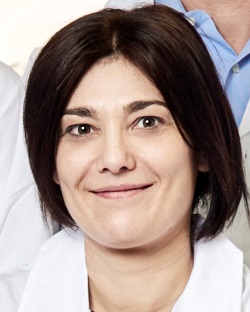
San Raffaele Telethon Institute for Gene Therapy
Mechanisms of peripheral tolerance

The development of novel approaches to control unwanted immune responses represents an ambitious goal in the management of immune-mediated diseases, including detrimental responses after protein/gene replacement therapies and in autoimmunity. Empowering the tolerogenic arm of the immune system would restore the immune balance leading to control of dysregulated immunity. The ability to modulate immune responses and promote tolerance makes regulatory cells, including T cells and dendritic cells (DCs), the cells of choice for the control of adverse immune responses. The research interests of the lab are i) to underpin the role of tolDCs in healthy and pathological conditions, ii) to identify the novel molecular mechanisms driving inflammatory/tolerogenic behavior of DCs and T cells, and iii) to dissect antigen-specific responses in patients undergoing protein replacement or gene therapy. The goal of our studies is to develop innovative and efficient tolerogenic approaches to circumvent adverse immune responses and (re)establish antigen-specific tolerance in immune-mediated diseases and in monogenic diseases after protein replacement therapy or gene therapy.
Research activity
The group focused its research on IL-10-secreting regulatory cells and contributed to the identification of DC-10, a subset of myeloid regulatory cells that are present in vivo and inducible in vitro (Gregori, Blood 2010; Amodio, Hematologia 2015; Comi, CMI 2020). DC-10 are tolerogenic DCs that secrete IL-10 and express HLA-G and ILT4, which render them inducers of type 1 T regulatory cells (Tr1) cells. We are currently defining the role of DC-10 in controlling immune responses in healthy and pathological conditions. Moreover, the group developed an innovative approach, based on Lentiviral Vector (LV)- mediated gene transfer to generate stable and effective human tolDCs suitable for cell-based approaches in autoimmune diseases and after protein/gene replacement therapies. One major hurdle in the development of cell and gene therapy approaches is indeed the induction of adverse immune responses elicited by the transgene itself and/or the vector-derived products, which may limit the overall efficacy of the therapy, especially in immunocompetent hosts. The knowledge generated by the deep characterization of the mechanisms underlying adverse immune responses to protein/gene replacement therapies (e.g., patients with lysosomal storage disorders undergoing enzyme protein replacement therapy or gene therapy) and in diseases due to tolerance breakdown (e.g., autoimmune diseases) will help developing novel approaches to circumvent detrimental immune responses and promote antigen-specific tolerance in protein replacement therapy and gene therapy.
The current Research Areas of our lab aim at:
- Studying the biology of regulatory cells and defining cell-based approaches to control unwanted immune responses in protein/gene replacement therapy and autoimmunity. The aims of this research area are i) to unravel the key molecular and cellular mechanisms modulating immune tolerance mediated by tolDCs and regulatory T cells (Tregs); ii) to identify novel targets controlling tolerogenic pathways; and iii) to generate stable and effective human tolDCs suitable for cell-based approaches. Our research is focused on IL-10-producing regulatory cells and on a peculiar myeloid cell-subset named DC-10. Our basic research studies aim at defining the role of DC-10 in promoting Tregs in pathological conditions (PoP conditions under investigation: Celiac Disease, autoimmune diseases, and male infertility), and at identifying new targeted strategies to restore tolerance by investigating the molecular mechanisms controlling inflammatory versus tolerogenic activity in DC-10, and DC-10-mediated priming of effector and Treg cells in healthy subjects and autoimmune patients. Our translational studies aim at developing innovative and effective tolDC-based approaches, by means of lentiviral vector (LV)-mediated gene transfer of tolerogenic factors to DCs or by targeting pro-tolerogenic pathways, with the final goal of modulating immune responses and promoting long-term tolerance via Treg induction in in protein/gene replacement therapies (PoP diseases include T1D, MPSIVA, and Pompe Disease) and autoimmunity
- Characterizing detrimental immune responses to protein replacement therapies and developing circumvention approaches. Protein replacement therapy is widely used as therapeutic treatment in monogenic diseases and LV-based gene therapy in vivo gave promising safety and efficacy results in pre-clinical animal models. However, in both settings immune responses directed towards recombinant proteins, vector-derived antigens, and transgenes may limit the efficacy of the therapies. We will dissect the presence, kinetic, and intensity of enzyme-specific immune responses in enzyme replacement therapy (ERT)-treated patients (PoP diseases MPSIVA, Pompe disease, and alpha-Mannosidases) and transgene-specific immune responses in pre-clinical settings (PoP diseases MPSI, MPSIVA, Pompe disease). With the aim of inducing antigen-specific tolerance and ensure long-term efficacy of the therapeutic proteins, we will also exploit novel tolDC-based approaches to circumvent adverse immune responses in the context of ERT or in vivo gene therapy.
Avancini D, Testori A, Fresolone L, Andolfi G, Vuono M, Martinelli V, Santoni de Sio FR, Gregori S Aryl Hydrocarbon Receptor Activity is Required Downstream IL-10 Signaling to Promote Regulatory Functions in Human Dendritic Cells Cell Rep. 2023 Mar 2;42(3):112193. doi: 10.1016/j.celrep.2023.112193. Online ahead of print.
Passeri L, Andolfi G, Bassi V, Russo F, Giacomini G, Laudisa C, Marrocco I, Cesana L, Di Stefano M, Fanti L, Sgaramella P, Vitale S, Ziparo C, Auricchio R, Barera G, Di Nardo G, Troncone R, Gianfrani C, Annoni A, Passerini L, Gregori S. Tolerogenic IL-10-engineered dendritic cell-based therapy to restore antigen-specific tolerance in T cell mediated diseases J Autoimmun. 2023 May 22;138:103051. doi: 10.1016/j.jaut.2023.103051. Online ahead of print.
Fortunato M, Amodio G, Gregori S IL-10-Engineered Dendritic Cells Modulate Allogeneic CD8+ T Cell Responses Int J Mol Sci. 2023 May 23;24(11):9128. doi: 10.3390/ijms24119128.
Amodio G, Mandelli A, Curto R, Rancoita PMV, Stabilini A, Bonfanti R, de Pellegrin M, Bosi E, Di Serio C, Battaglia M, Gregori S. Altered Frequency and Phenotype of HLA-G-Expressing DC-10 in Type 1 Diabetes Patients at Onset and in Subjects at Risk to Develop the Disease. Front. Immunol. 2021 Oct 1;12:750162. doi: 10.3389/fimmu.2021.750162. eCollection 2021.
Alfano M, Tascini AS, Pederzoli F, Locatelli I, Nebuloni M, Giannese F, Garcia-Manteiga JM, Tonon G, Amodio G, Gregori S, Agresti A, Montorsi F, Salonia A. Aging, inflammation and DNA damage in the somatic testicular niche with idiopathic germ cell aplasia. Nat Commun 2021 Sep 1;12(1):5205. doi: 10.1038/s41467-021-25544-0.
Russo F, Citro A, Squeri G, Sanvito F, Monti P, Gregori S, Roncarolo MG, Annoni A. InsB9-23 Gene Transfer To Hepatocytes-Based Combined Therapy Abrogates Recurrence of Type-1 Diabetes After Islet Transplantation. Diabetes. 2020 Oct 29:db191249. doi: 10.2337/db19-1249.
Comi M, Amodio G, Passeri L,Fortunato M, Santoni de Sio FR, Andolfi G, Kajaste-Rudnitski A, Russo F, Cesana L and Gregori S. Generation of Powerful Human Tolerogenic Dendritic Cells by Lentiviral-Mediated IL-10 Gene Transfer. Front. Immunol. 11:1260. doi: 10.3389/fimmu.2020.01260
Comi M., Avancini D., Santoni de Sio F., Villa M., Uyeda M.J., Floris M., Tomasoni D., Bulfone A., Roncarolo M.G., Gregori S. Co-expression of CD163 and CD141 identifies human circulating IL-10-producing dendritic cells (DC-10).Cell Mol Immunol. 2019 Mar 6. doi: 10.1038/s41423-019-0218-0. [Epub ahead of print]. IF: 7.551
Squeri G, Passerini L, Ferro F, Laudisa C, Tomasoni D, Deodato F, Donati MA, Gasperini S, Aiuti A, Bernardo ME, Gentner B, Naldini L, Annoni A, Biffi A, Gregori S. Targeting a Pre-existing Anti-transgene T Cell Response for Effective Gene Therapy of MPS-I in the Mouse Model of the Disease. Mol Ther. 2019 Jul 3;27(7):1215-1227.
Roncarolo MG, Gregori S, Bacchetta R, Battaglia M, Gagliani N. The Biology of T Regulatory Type 1 Cells and Their Therapeutic Application in Immune-Mediated Diseases. Immunity. 2018 Dec 18;49(6):1004-1019.
Locafaro G*, Andolfi G*, Russo F, Camisa B, Ciceri F, Bondanza A, Roncarolo MG*, Gregori S. HLA class I-dependent targeting of myeloid leukemia by IL-10-engineered human CD4+ Tr1 cells. Mol Ther. 2017 Oct 4;25(10):2254-2269. *Equal contributors.
Gagliani N, Magnani CF, Huber S, Gianolini ME, Pala M, Licona-Limon P, De’Broski H, Bulfone A, Bacchetta R, Andreani M, Gregori S*, Flavell R*, Roncarolo MG*. Co-expression of CD49b and LAG- 3 identifies human and murine Tr1 cells. Nat Med. 2013 Jun;19(6):739-46. *Equal contributors.
Andolfi G, Fousteri G, Rossetti M, Magnani CF, Jofra T, Locafaro G, Bondanza A, Gregori S*, Roncarolo MG*. Enforced IL-10 expression confers type 1 regulatory T cell (Tr1) phenotype and function to human CD4(+) T cells. Mol Ther. 2012 Sep;20(9):1778-90. *Equal contributors.
Gregori S, Tomasoni D, Pacciani V, Scirpoli M, Battaglia M, Magnani CF, Hauben E, Roncarolo MG. Differentiation of type 1 T regulatory cells (Tr1) by tolerogenic DC-10 requires the IL-10-dependent ILT4/HLA-G pathway. Blood. 2010 Aug 12;116(6):935-44.
Gregori S, Giarratana N, Smiroldo S, Uskokovic M, Adorini L. A 1a,25- dihydroxyvitamin D3 analog enhanced regulatory T cells and arrests autoimmune diabetes in NOD mice. Diabetes 2002, May;51(5):1367-74.
Marta Fortunato
PhD student
Konstantina Morali
PhD student
Giorgia Giacomini
Postdoc fellow
Giada Amodio
Postdoc fellow
Michela Vuono
Research fellow
Gloria Giacomello
Research assistant
Grazia Andolfi
Senior technician
Francesca Santoni De Sio
Staff scientist
Paola Rampa
Research fellow
Aurora Forlani
Research fellow
Laura Passerini
Staff scientist
Valentina Consoli
Research fellow












